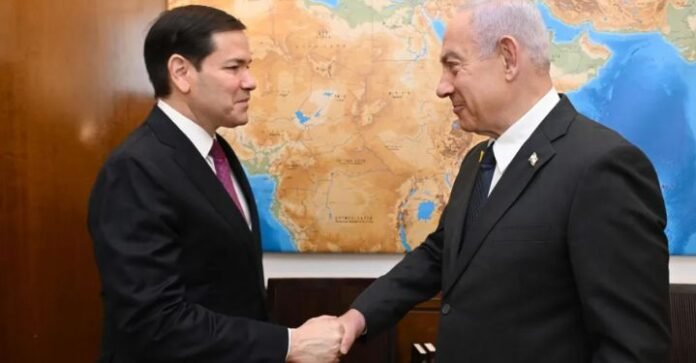Hamas figures in Doha, declaring that Hamas leaders can no longer assume safety from Israeli operations — “wherever they are.” The comments, made at a joint press conference with U.S. Secretary of State Marco Rubio in Jerusalem, have sparked intense international concern and raised questions over the future of cross‑border operations, diplomacy, and regional stability.
What Did Netanyahu Say?
Netanyahu’s remarks came in response to the Doha strike, in which Israel targeted Hamas political leaders gathered in Qatar, ending in the deaths of six people — five Hamas members and a Qatari security officer. While the main leadership was reported to have survived, the message was unmistakable: no guarantee of immunity for Hamas figures based solely on their location.
At the press conference, he said that every country has the right to defend itself beyond its borders, and that the principle “terrorists should not have immunity wherever they are” was not established by him, but would be upheld.
Context: The Doha Strike & Its Fallout
On September 9, Israel launched an airstrike in Doha targeting Hamas figures allegedly reviewing a U.S.‑backed ceasefire proposal. The strike drew condemnation from Qatar and many countries in the Arab and Islamic world. Qatar decried the attack as a violation of its sovereignty, and the broader diplomatic community warned that such operations risk undermining peace processes and triggering wider regional escalation.
This meeting, according to reports, was part of ongoing discussions involving mediators about achieving a ceasefire and possibly releasing hostages. The timing of the strike has led many to question whether diplomatic channels can remain viable when such targeted operations are carried out in mediating states.
U.S. Reaction & Diplomacy at a Precipice
During the Jerusalem press event, Secretary of State Marco Rubio expressed U.S. support for Israel’s security concerns — including its desire to degrade Hamas’s operational capabilities. However, Rubio also stressed the importance of Qatar’s role in mediation, and hinted at concerns about the strike’s potential to degrade trust in diplomatic processes.
Some states and observers have raised concerns about the legality, morality, and long‑term strategic implications of targeting Hamas leaders in sovereign states involved in diplomacy. Qatar, in particular, has condemned the strike, labeling it reckless and dangerous.
Strategic Implications & Risks
Netanyahu’s positioning — that no place is automatically safe for Hamas leadership — may be meant to reinforce deterrence. By suggesting that Israel is willing to strike “wherever they are,” the goal appears to be to keep Hamas leadership off‑balance, reduce safe havens, and possibly deter future planning or operations. But this comes with serious risks:
- Sovereignty concerns: Strikes inside other countries, especially those acting as mediators, could be seen as violations of sovereignty, provoking diplomatic fallout.
- Diplomatic erosion: Countries that host or mediate with Hamas may feel penalized or fearful of enabling dialogue, which may reduce or complicate peace negotiations.
- Humanitarian, legal, and moral questions: The risk of collateral damage is higher when operating beyond one’s borders; there are questions of whether international law is being stretched, and how to manage unintended consequences.
- Escalation risk: Such operations can provoke retaliatory responses — directly or indirectly — possibly widening the conflict.
What’s Next / What to Watch For
Given Netanyahu’s statement, several developments are likely to unfold:
- Monitoring Hamas’s response: Hamas may respond by dispersing leadership, reducing visibility, or moving to even more discreet operational modes; or it may intensify its own rhetoric or operations.
- Actions by mediator states: Qatar and others may demand stronger guarantees, seek new diplomatic protections, or even consider legal and political counter‑measures to what they regard as breaches of sovereignty.
- International scrutiny: The United Nations, human rights organizations, and legal scholars are likely to examine whether these operations comply with international law — including rules around armed conflict, sovereignty, and due process.
- Effect on hostage negotiations: The strike was linked to ongoing talks concerning ceasefire and hostage release. This kind of operation may complicate such negotiations — opponents may see them as acting in bad faith or as undermining mediated offers.
Why Netanyahu Might Be Taking This Harder Line
Several motivating factors appear to underlie this shift:
- Domestic pressure: After the October 2023 Hamas attack, many in Israel expect decisive action. There is strong public demand for accountability, deterrence, and the return of all hostages.
- Strategic messaging: By signaling that there are no safe zones, Israel may aim to degrade Hamas’s capacity to organize, plan, or coordinate attacks from abroad.
- Regional dynamics: Israel likely wants to ensure that Hamas cannot rely on international mediation venues or foreign safe havens as protective shields; in doing so, it may be seeking to reshape the operational map in its favor.
- Support or at least acquiescence from major backers: The U.S.’s current stance appears to provide political cover, though it is a careful line: backing Israel’s right to self‑defence while expressing concern for diplomatic norms.
Conclusion
Netanyahu’s recent statements make clear that Israel is no longer bound by geographical limits when it comes to pursuing Hamas leadership. The Doha strike has set a precedent — possibly a watershed — in how Israel views cross‑border operations, immunity, and the geography of conflict.
What remains to be seen is how this approach will play out on the world stage: whether it galvanizes condemnation, breeds resistance, or forces diplomatic recalibrations — and whether it ultimately contributes to Israel’s stated goals of degrading Hamas, freeing hostages, and achieving a more secure peace, or whether it further complicates a conflict mired in destruction, distrust, and geopolitical tension.

